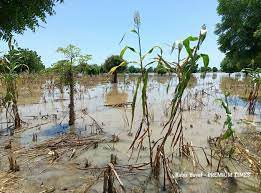Heavy rains destroyed 700,000ha of farmland in northern Nigeria, wiping out the main source of income for thousands of households and worsening the food security crisis.
The Director-General of the National Emergency Management Agency (NEMA), Mustapha Ahmed, last month issued a warning of upcoming severe flooding this year as indicated by predictions from relevant agencies. Now nearly 700,000ha of farmland in northern Nigeria has been damaged, at least 600 people killed and millions forced to flee their homes. The floods came just as farmers prepared for the harvest, prompting fears for food security. In January, UNICEF estimated 19-million Nigerians were in desperate need of food, and said that come June the number would increase to 25-million. Nigeria has now said it would spend $2 million to repair flood damage and donor agencies have pledged to support farmers in nine of Nigeria’s 36 states with seedlings and fertilizers.
“The flood disaster in 2022 was an eye-opener,” Ahmed said and advised that those living around water channels and floodplains should take precautions. “We have started early this year, as we are ready for early warning and early action. We will bombard every citizen, state and local government with this information as we want them to know that it is serious and we will not keep quiet, because we want them to know that there will be flood this year.”
Nigeria was still emerging from coronavirus lockdowns that disrupted the planting cycle when Russia’s invasion of Ukraine last year dealt a major blow to the fertilizer and grain supply chain across Africa, said Ayokunle Afolabi-Toye from University of Ilorin (Unilorin) in Western Nigeria. Farmers were trying to find their feet when the floods destroyed crops in Nigeria’s food-producing states, he said. Now the floods have receded, many thousands of hectares remain uncultivated as weary and debt-ridden farmers say they cannot afford all the seed they need to replant their fields.



